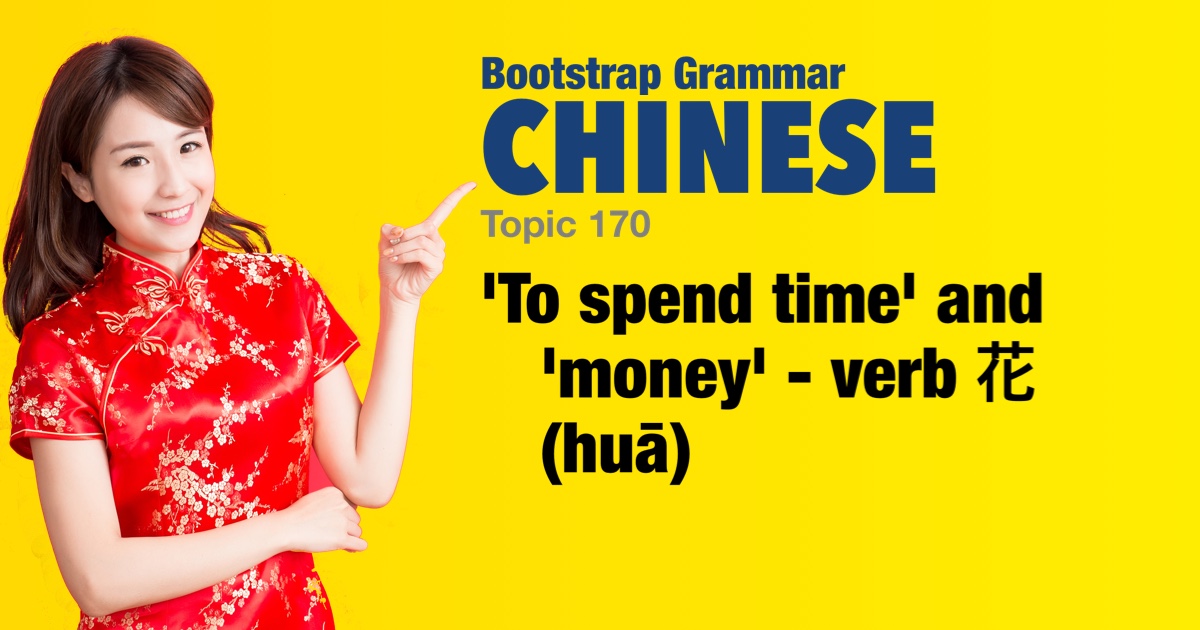Chinese grammar - 'To spend time' and 'money' - verb 花 (huā) |
|||
|
|||
The verb 花 (huā) in Chinese is commonly used to mean "to spend" in the context of time or money. It implies the expenditure of a resource, whether it be time, money, or effort. Note that 花 (huā) as a noun means 'flower'. |
| Examples: | |
|
他花了很多时间学习。
tā huā le hěn#duō shíjiān xuéxí. He spent a lot of time studying. |
|
|
我们花了一千块钱买这台电脑。
wǒmen huā le yìqiān kuài#qián mǎi zhè tái diànnǎo. We spent 1,000 yuan buying this computer. |
|
|
我花了两小时完成作业。
wǒ huā le liǎng xiǎoshí wánchéng zuòyè. I spent two hours finishing my homework. |
|
|
他花了很多钱买那辆车。
tā huā le hěn#duō qián mǎi nà liàng chē. He spent a lot of money buying that car. |
|
|
她每天花一个小时锻炼身体。
tā měitiān huā yí ge xiǎoshí duànliàn shēntǐ. She spends an hour exercising every day.
|
|
|
我们将花一整天去参观博物馆。
wǒmen jiāng huā yì zhěng tiān qù cānguān bówùguǎn. We will spend the whole day visiting the museum.
|
|
|
你花了多少钱买这本书?
nǐ huā le duō shǎo qián mǎi zhè běn shū? How much money did you spend on this book? |
|
|
我今天要花几个小时整理房间。
wǒ jīntiān yào huā jǐ ge xiǎoshí zhénglǐ fángjiān. I will spend a few hours tidying up the room today.
|
|
|
他们打算花两周去旅游。
tāmen dǎsuàn huā liǎng zhōu qù lǚyóu. They plan to spend two weeks traveling.
|
|
|
你每天花多少时间学习?
nǐ měitiān huā duō shǎo shíjiān xuéxí? How much time do you spend studying every day? |
|
|
她昨天花了五百块买衣服。
tā zuótiān huā le wǔ#bǎi kuài mǎi yīfu. She spent 500 yuan on clothes yesterday. |
|
|
我不想花太多时间做这个任务。
wǒ bù xiǎng huā tài duō shíjiān zuò zhè ge rènwù. I don't want to spend too much time on this task. |
|
|
我经常花很多时间学习中文。
wǒ jīngcháng huā hěn#duō shíjiān xuéxí zhōngwén. I often spend a lot of time studying Chinese. |
|
|
他花了三天时间修理电脑。
tā huā le sān#tiān shíjiān xiūlǐ diànnǎo. He spent three days repairing the computer.
|
|
|
她在这次旅行中花了很多钱。
tā zài zhè#cì lǚxíng zhōng huā le hěn#duō qián. She spent a lot of money during this trip.
|
|
|
我们花了一小时讨论这个问题。
wǒmen huā le yì xiǎoshí tǎolùn zhège wèntí. We spent an hour discussing this issue. |
|
|
他每天花两个小时锻炼身体。
tā měitiān huā liǎng ge xiǎoshí duànliàn shēntǐ. He spends two hours every day exercising. |
|
|
你花这么多时间学习,有没有效果?
nǐ huā zhème#duō shíjiān xuéxí,#yǒuméiyǒu xiàoguǒ? You spend so much time studying, is there any result?
|
|
|
他们在这个项目上花了太多钱。
tāmen zài zhège xiàngmù shàng huā le tài#duō qián. They spent too much money on this project. |
|
|
她总是花时间帮助别人。
tā zǒngshì huā shíjiān bāngzhù biérén. She always spends time helping others.
|
|
|
我们花了整个周末整理房子。
wǒmen huā le zhěnggè zhōumò zhénglǐ fángzi. We spent the whole weekend organizing the house.
|
|
|
他为了通过考试花了很多钱买资料。
tā wèile tōngguò kǎoshì huā le hěn#duō qián mǎi zīliào. He spent a lot of money buying materials to pass the exam.
|
|
 |
|



